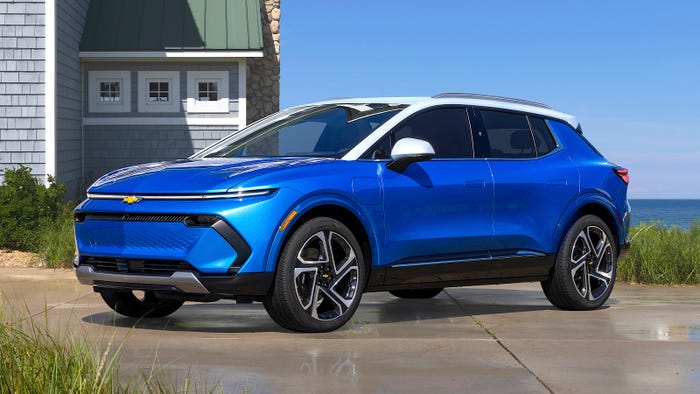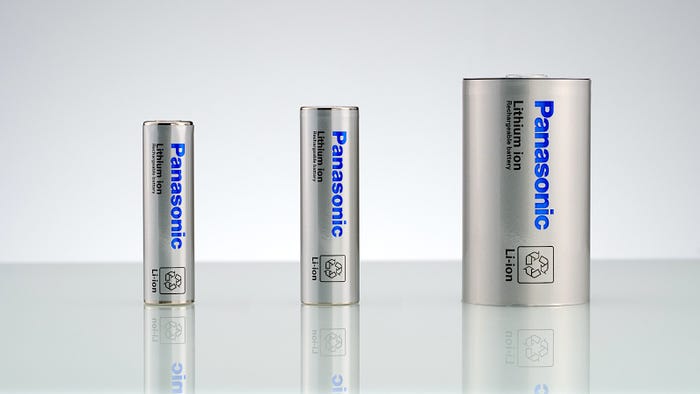Can a Battery Guru Right the EV Ship at GM?
Formative Tesla battery engineer Kurt Kelty is tasked with saving General Motors’s battery program.
February 13, 2024
.gif?width=850&auto=webp&quality=95&format=jpg&disable=upscale)
At a Glance
- Kelty brings Panasonic/Tesla battery expertise
- GM's Ultium battery program is in disarray
- Ultium weight and manufacturing efficiency are key hurdles
The General Motors EV program is in turmoil, with the company announcing delays to previously announced rollouts of important new battery-powered vehicles while churning through executive leadership. GM’s most recent chief technical officer, Gil Golan, resigned in October after a month on the job. Before him was Kent Helfrich, who replaced Matt Tsien in 2021.
The company’s first step to getting its Ultium battery and electric drive program back on track is the announced hiring of Kurt Kelty from battery materials company Sila Nanotechnologies as GM’s vice president of battery. He has his work cut out for him.
Who Is This Guy?
Kelty built his credentials as Tesla’s director of battery technology from 2006 until 2017, where he oversaw battery cell selection, supplier contracts, and quality control. He also led the partnerships and materials sourcing for Tesla’s Nevada Gigafactory battery plant. That included planning, building, and managing what he says was the world’s largest battery cell test lab, with the largest number of test channels in the U.S., according to his LinkedIn bio.
Before that, he spent 14 years at Tesla’s Gigafactory partner, Panasonic. Until he was hired by GM, Kelty was vice president for commercialization for Sila Nanotechnologies, where he pushed the commercialization of that company’s silicon anode technology for lithium-ion batteries. He also served as a board member for Auto Motive Technologies for three years, until Ford bought that company in November 2023.

New GM battery vice president Kurt Kelty. GENERAL MOTORS CO.
“I'm excited about this opportunity, mainly because of the massive impact it could have on increasing EV sales,” Kelty posted on LinkedIn. His background builds a strong case for Kelty’s ability to put GM’s battery program back on the right path.
Tough Assignment
Kelty is charged with revising GM’s battery cell strategy and developing a new end-to-end approach, including the use of raw materials, research, developing and investing in new technology, commercialization of cells and packs, and end-of-life opportunities for batteries. His assignment, according to GM’s announcement of his hiring is to “more quickly deliver profitable, lower-cost, higher performing electric vehicles to customers at scale.”
GM has announced grand production plans for EVs and aggressive schedules for advancing battery technology but has missed those targets and delayed schedules. Elon Musk almost without exception does the same thing, but without ever acknowledging the missed deadlines and generally conveying the impression that he has his fingers crossed whenever he announces product timelines.
General Motors, on the other hand, seems genuinely surprised to have failed to achieve its ambitious goals. It recalls the old PC industry joke: “What’s the difference between a car salesman and a computer salesman? A car salesman knows when he’s lying.” So while Musk seemingly lies on purpose, GM apparently didn’t know how tough the challenges were that it faced when it made those statements.
Man Plans, and God Laughs
Four years ago, General Motors held a splashy media briefing to show off its grand plans for shifting to battery-electric vehicles using its Ultium battery and electric drive architecture. Among other things, GM executives explained their plan to drive down battery cost from $145 per kilowatt-hour in 2020 to less than $100/kWh “early in the lifecycle” of its Ultium batteries.
Instead, during the intervening years, GM endured the stop-sale of its Chevrolet Bolt EV due to battery fires. Those batteries were not the Ultium design but were supplied by Ultium partner LG Chem. During October’s earnings call with analysts, GM CEO Mary Barra announced the delay of its Chevrolet Equinox EV, Chevrolet Silverado EV, and GMC Sierra EV pickup trucks, with a new plant dedicated to mass production of those pickups pushed back until late 2025.

The 2025 Chevrolet Equinox EV. GENERAL MOTORS CO.
She also walked back forecasts to sell 400,000 EVs in North America from 2022 through mid-2024 and admitted missing the goal of selling 100,000 EVs by the end of 2023. She maintains that GM will still achieve its stated objective of selling a million EVs by 2025.
The company sold 19,469 EVs in 2023, including the Brightdrop commercial delivery vans. This number has been constrained by GM’s inability to manufacture Ultium cells at scale, and 12,551 vehicles in that number were Chevrolet Bolts, which use older, non-Ultium LG Chem cells.
Pouch or Cylindrical Cells?
This points to Kelty’s biggest challenge, according to Sam Abuelsamid, principal analyst for transportation and mobility at Guidehouse Insights. “It's possible that Kelty will push GM to abandon the current Ultium battery modular architecture which could result in reduced costs and especially weight,” he observed. “He may even push GM toward adopting cylindrical cells, although that’s speculation.”
Ultium batteries use pouch-style cells, though the company touted the ability to pivot to prismatic battery cells if necessary. Kelty’s experience at Panasonic and Tesla is with cylindrical cells that resemble AA consumer batteries. Will Kelty push GM toward cylindrical cells or can he streamline Ultium pouch manufacturing sufficiently for the company to be competitive?

Panasonic's cylindrical battery cells. PANASONIC
“His presence alone is no guarantee that GM/Ultium will be able to overcome the manufacturing issues they’ve had that limit production capacity,” Abuelsamid said. “I don’t know enough about him to judge if he’s got the skills to push back against the GM system and resolve all of the issues the company is having.”
GM’s said in 2020 that it was investing $20 billion through 2025 to develop its EV technology and it may be too committed to pouch cells to switch now. “I doubt it will happen anytime soon,” he added. “They’ve invested too much in pouch cell lines to abandon that right now and I’m not sure it will provide that much benefit.”
Cost Cutting
In the earnings call, Barra said that GM is making progress on its stated goal of reducing battery cost, citing what she said has been a 45-percent decrease in the cost of batteries in the last 12 months. “We also expect to achieve significant margin improvement on our battery-electric trucks through engineering efficiency and improvements, supplier costs, and reducing order complexity, buildable combinations, and manufacturing complexity,” Barra stated.
Thanks to those reductions, VisualCapitalist.com found that GM’s battery cost for the 2025 Cadillac Escalade is $112.7/kWh, based on data gathered by Benchmark Minerals Intelligence. By comparison, the Tesla Model S’s battery, which uses Panasonic cells from the Gigafactory, costs $120.3/kWh.
Industrywide EV battery costs average $139/kWh, according to Statistica, which represents a slight drop from $160/kWh in 2020, when GM announced its battery roadmap to sub-$100/kWh batteries.
So perhaps GM is making progress on the cost of Ultium batteries, but weight and production efficiency remain as the key puzzles for Kelty to solve.
About the Author(s)
You May Also Like



